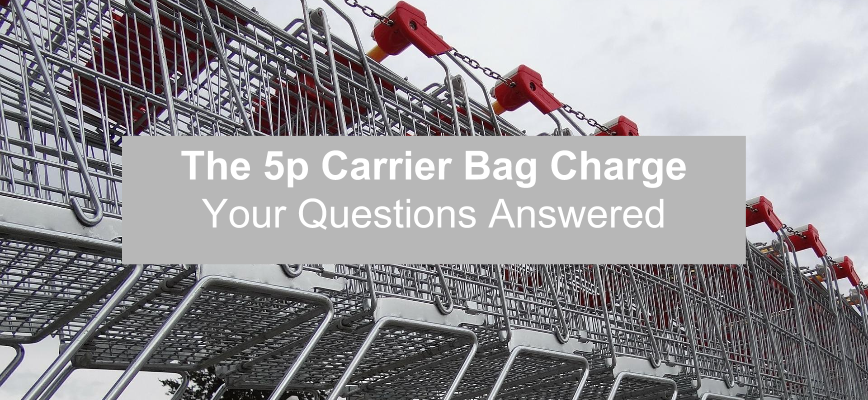On the 5th October we saw the introduction of the 5p carrier bag charge, but why?
Whilst I can completely understand that supermarkets give away far too many polythene carrier bags, which are causing environmental problems, it is not only the supermarkets that are targeted with the bag charge. This I was a little perplexed about.
It seems that the country has gone just a little bit crazy since the introduction of the 5p bag charge. The newspapers are reporting all kinds of incidents of people trying to avoid paying the charge. It seems that every supermarket these days has manned guards, which is where the responsibility for enforcing the charge has fallen. Supermarket security guards are having to deal with shoppers taking baskets and trolleys as an alternative to paying the 5p charge. Really?
So before I get into the full flow of Christmas shopping I thought I would research the 5p bag charge, so that I am well versed when chatting to retail staff and fellow shoppers. I think this 5p bag charge will be the topic of conversation for some time.
Here are the facts:
Who has to charge for plastic bags?
Large retailers must charge 5p for a new, single-use carrier bag. A large retailer is defined as one who employs 250 people or more full-time staff in a year. It is voluntary for smaller retailers to follow the scheme.
Does the charge apply to all plastic bags?
The charge applies to all bags that are new (or unused) with a plastic thickness of less than 70 microns (0.7mm), which is pretty much any of the bags that you are given in shops. The bags has to have handles too.
Why are we being charged for bags?
Well, there are a number of reasons. Firstly there is the length of time these bags take to decompose. With that being 1,000 years they are clearly not going anywhere soon. Polythene carrier bags often end up as litter which incurs clean up costs. The bags are also a danger to wildlife as they can choke or poison many animals and birds.
The government’s aim to encourage shoppers to reuse old bags and refrain from using so many new ones. As a knock on effect from this change in consumer behaviour the government expect to see an 80% reduction in supermarket plastic bag use. The high street is expected to see a 50% reduction too.
Are there any bags that are still free?
There is a very specific list of things that you can still be expected to put into a carrier bag without incurring the 5p charge, predominantly for the purpose of food safety. They are:
- raw meat, fish and poultry
- unwrapped food
- loose seeds and flowers
- unwrapped blades
- prescribed medicine
- retail bags on ships, planes, trains and at airports
Does the charge apply to home shopping deliveries?
Yes, the 5p charge applies to home shopping deliveries. Although it is being approached in different ways by different supermarket chains. Most are offering a “no bag” or “bagless” delivery service, whilst others have implemented a fixed fee for bags regardless of how many there are. Others, like Morrisons, are charging per bag but are refunding customers when they return the used bags.
Can the bag charges be avoided?
Well, of course the simplest answer is yes, if you take you own bags wherever you go shopping. We will all get used to it, I am sure.
The only other real alternative is to you local, smaller retailer who are not covered by the new law. Be careful though as they can still uphold the charge if they wish to do so.
What do you think of these new charges? Have you got used to taking your bags with you whenever and wherever you go shopping? We would love to hear your thoughts in our comments.

Be the first to comment on "The 5p Carrier Bag Charge – Your Questions Answered"